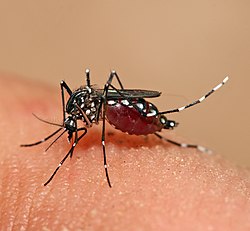Aedes
| Aedes | |
|---|---|
 |
|
| Aedes aegypti | |
| Scientific classification | |
| Kingdom: | Animalia |
| Phylum: | Arthropoda |
| Class: | Insecta |
| Order: | Diptera |
| Family: | Culicidae |
| Subfamily: | Culicinae |
| Tribe: | Aedini |
| Genus: |
Aedes Meigen, 1818 |
| Type species | |
|
Aedes cinereus Meigen, 1818 |
|
| Species | |
|
See List of Aedes species |
|
See List of Aedes species
Ae. aegypti
Ae. albopictus
Ae. australis
Ae. cinereus
Ae. polynesiensis
Ae. rusticus
Ae. vexans
Aedes is a genus of mosquitoes originally found in tropical and subtropical zones, but now found on all continents except Antarctica. Some species have been spread by human activity. Aedes albopictus, a most invasive species, was recently spread to the New World, including the United States, by the used-tire trade. First described and named by German entomologist Johann Wilhelm Meigen in 1818, the generic name comes from the Ancient Greek ἀηδής, aēdēs, meaning "unpleasant" or "odious". The type species for Aedes is Aedes cinereus. Some species of this genus transmit serious diseases, including dengue fever, yellow fever, the Zika virus, and chikungunya. In Polynesia, the species Aedes polynesiensis is responsible for the transmission of human lymphatic filariasis.
...
Wikipedia
